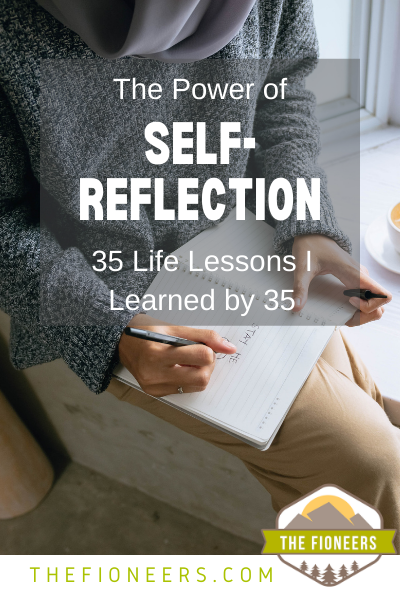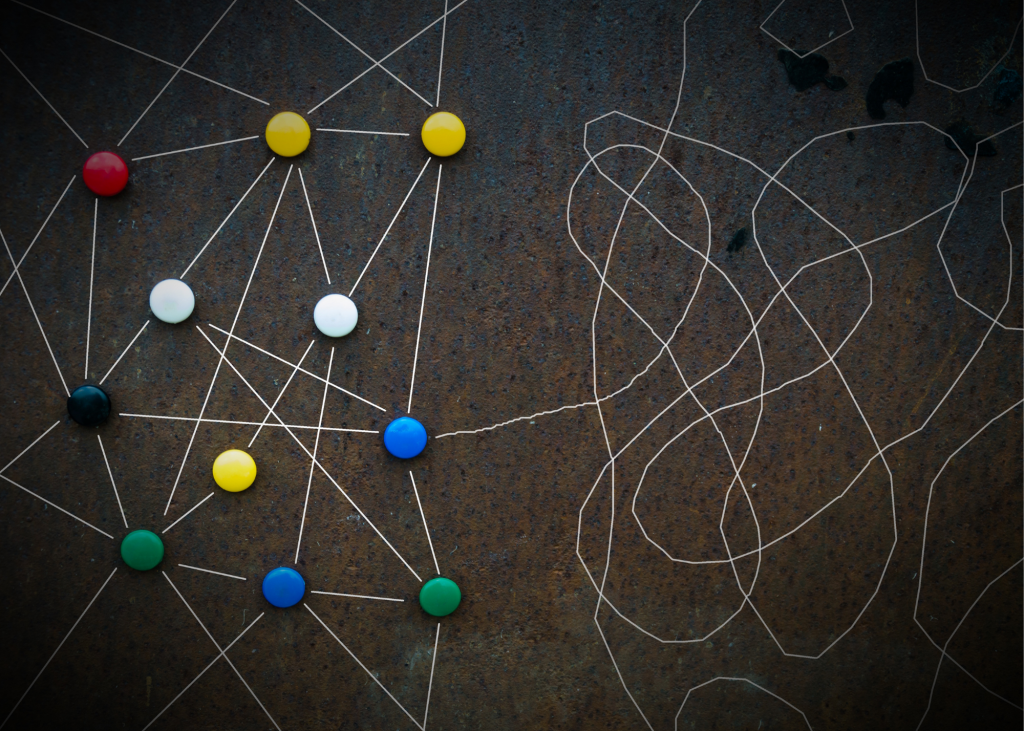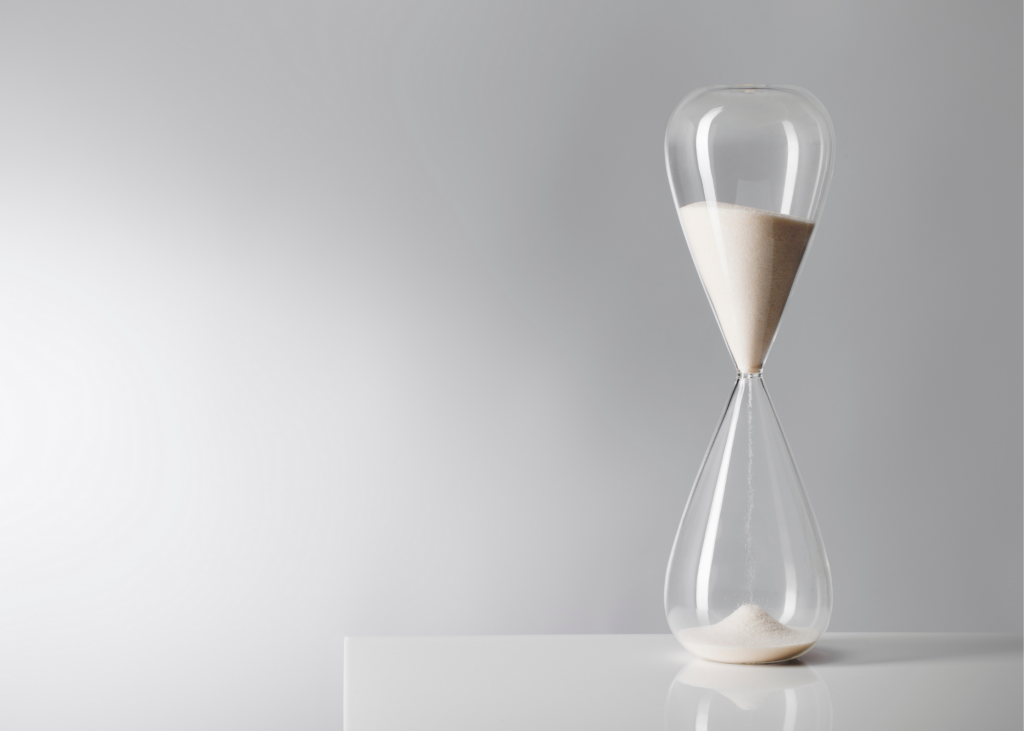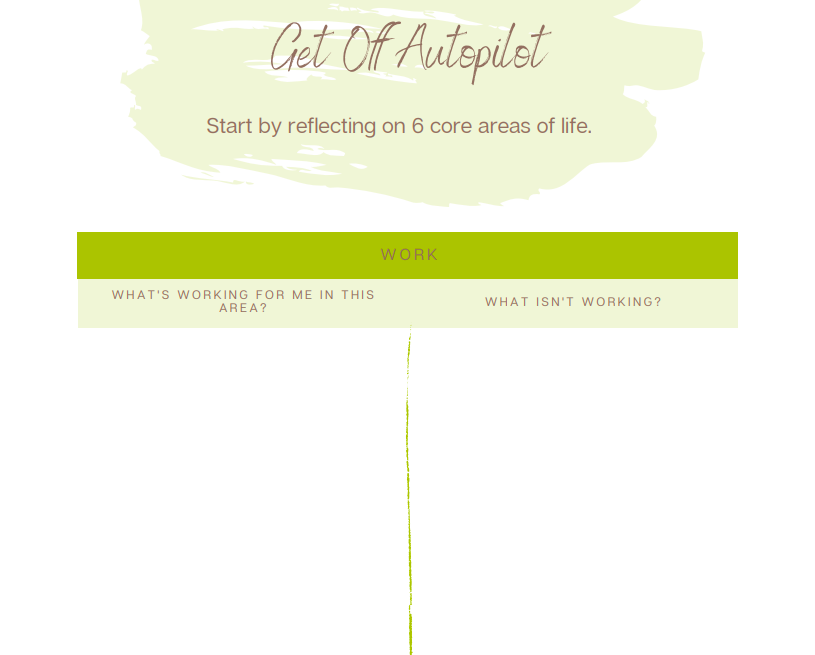

In early March, I turned THIRTY-FIVE. For some reason, this feels like a big milestone. I’m no longer in my early thirties. I am squarely in my MID-THIRTIES.
On the morning of my 35th birthday, I realized that I’ve never reflected comprehensively on the lessons that I’ve learned. I’ve reflected back on things I’ve learned on an annual basis or another short timeframe. But, I’d never looked at my whole life.
So, I decided that I was going to write a list of 35 life lessons I learned in my 35 years on earth. I can’t wait to share them with you.
The Importance of Self-Reflection
Before I share my 35 life lessons, I want to share a little bit about why reflection is so valuable. To be clear, I did this simply because I wanted to.
Afterward, I was curious to learn why reflecting on our experiences is so valuable. Perhaps articulating the why will encourage you to do your own reflection.
Reflection Requires us to Slow Down and Become More Self-Aware
Slowing down to take a moment of reflection can make a huge difference in your day. In fact, there was a study that showed that people who were prompted to use their commute time for reflection were happier, more productive, and less burned out.
Slowing down allows us to improve our self-awareness. When we celebrate our successes and learn from the things that didn’t go as well as we’d like, we become more self-aware. We learn who we are, what we want, and what’s important to us. Being more self-aware leads to higher levels of fulfillment in our lives.
Reflection Allows us to Connect the Dots and Facilitates a Deeper Level of Learning
If we don’t reflect on the things that we learn, we will have a much harder time incorporating these things into our daily life. Or, we might forget them entirely.
Think about a time you read a book, attended a workshop, or had a helpful conversation with a mentor. Do you remember thinking, “This is good… I need to remember this?” But, looking back, you realize that you don’t remember a single thing.
I’ve been there too. This is why reflection is so important.
Reflection “gives the brain the opportunity to pause amidst the chaos, untangle and sort through observations and experiences, consider multiple possible interpretations, and make meaning. This meaning becomes learning, which can then inform future mindsets and actions.”
When we reflect on the things we learn, it allows us to put that learning into practice and take action. Without that, it’ll remain an idea that becomes fleeting and fades away.


Once we connect the dots through reflection for ourselves, it allows us to help others. Without processing something ourselves, we can’t put it into practice. If we don’t do that, it’s unlikely that we’ll be able to articulate the important learning that could help someone else.
Reflection Encourages us to Question our Assumptions
If we don’t reflect on our experiences, it’s likely that we’ll move through life without questioning our assumptions. “This is just the way things are,” we might think.
Once we take time to step back and reflect on our experiences, it allows us to both identify and question the assumptions about what we believe is true.
Before I started my FI journey, I was in a dark place. I knew I was unhappy with my life, but I assumed that it wasn’t worth thinking about. After I started to step back and reflect on my life, I identified that this was an assumption and decided to question it.
Why did I believe that it wasn’t worth thinking about?
My initial thought went something like this, “It’s not worth thinking about because there aren’t any other options. Thinking about it will prove that to me and just make me more disappointed and miserable.”
Then, I was able to ask myself, “But, is that actually true? Are there truly no other options?”
When I learned about financial independence, I knew that this assumption wasn’t true.
Now, I know that I can build financial freedom and use it to design a life I love long before retirement. Without reflection, I would have never realized this.
Reflection can also help us to question the assumptions (or limiting beliefs) we hold about ourselves.
When we think, “I could never do that,” or, “I’m not _______ enough,” reflection allows us to question those assumptions. We can ask:
- Why do I believe I could never do that?
- What if that weren’t true?
- What evidence do I have that it isn’t true?
It also allows us to start focusing on possibilities. We can ask:
- If I wanted to do that, what would it require?
- What resources (time and money) would I need?
- What skills would I need to build?
- What relationships would I need to seek out?
- What don’t I know about this? How could I answer those questions?
Reflection allows us to articulate what we actually believe so that our assumptions don’t hold us back.
35 Life Lessons by 35
Reflecting on 35 life lessons that I learned by 35 was an incredibly valuable exercise. It allowed me to:
- Identify the most important things I’ve learned (even if I learned many of them the hard way).
- Articulate what I’ve learned, so that I’m more likely to remember and put it into practice in the future.
- Question my assumptions.


For most of these life lessons, I could write an essay on what I used to believe and how that differs from what I now believe. In fact, I’ve started doing this on my Instagram. This was all a result of questioning assumptions.
Here are my 35 Life Lessons by 35:
Work
- I am not my job. My identity is much bigger than my job title or how much money I make.
- The goal is not to escape from work. It’s to design a life I don’t want to retire from.
- It’s possible to love your work. Even so, it doesn’t have to be my whole life.
Personal Growth
- I deserve to thrive. We all do.
- Being honest about what’s not going well is the first step to making it better.
- I get to create my own definition of success. To me, success means that I know what I value, and I have time and energy to devote to those things.
- Enjoying the journey is more important than the outcome. If I won’t enjoy the process, maybe it’s time to find a new goal.
- I don’t need to take big scary leaps. I am not a wimp if I don’t live by the belief that “if I leap, the net will appear.” I can build my own net. Through experimentation, I build my confidence and increase my chances of success. Then, each step forward feels like a logical next step.
- We all have the capacity within us to do just about anything. The best question to ask is, “How could this be possible?”
- Embedding myself into a supportive community is the most important thing I can do to achieve any goal.
- My inner critic does not have the final word.
- I am a resourceful problem-solver. I can work through any challenge that comes my way.
- It’s possible to have too much grit.
- When I write, things stop swirling around in my head, and I get clearer about what I believe and want.
Health and Wellness
- I want to pay attention to how I actually feel rather than how I think I should feel.
- All of my emotions are valuable. I don’t need to run away or try to change negative emotions. They are trying to communicate something valuable to me.
- Being anxious all the time is not “normal.” There are things that can help (medication, therapy, mindfulness, and skill-building).
- The purpose of self-care is never to adjust to oppression. It’s to get us to a place where we can address the situation or get out.
- I want to fill myself up so much that kindness and generosity can overflow to the people around me.
- Being healthy and pain-free is more important than having lots of money.
- Maintaining mental and physical health (and preventing issues) is way easier than recovering from issues.
Finances
- Building financial freedom provides me with more options and more power, even though I still need to generate income.
- Spending less money means I can work less.
- I can spend money on things that add value to my life and feel great about it.
- Having money doesn’t make me a good or a bad person. It’s simply a tool I can use to express who I truly am.
- Investing in myself, my health, and my growth is important. I’m worth it.
Boundaries and Limits
- I can both care about what’s going on in the world and protect my peace. In fact, protecting my peace is a necessary part of caring.
- The best self-care is subtraction.
- Having more stuff adds more stress to my life.
- Routines and habits don’t limit my freedom. Organizing my life makes my life better, more creative, more spacious, and more fun.
- I don’t need to be busy to feel important or valuable.
- I say “no” to the wrong things, so I have space to say “HELL YES” when the right thing comes along.
- Each person gets to choose their unique path based on their situation and desires. It is not my job to tell them what they should do. Not is it their job to tell me what I should do.
- Clear communication is a kindness to people around you. Then, they don’t have to guess where your boundaries are.
- If someone isn’t receptive to my boundaries, they don’t deserve my time.
Building a Reflective Practice Into Your Own Life
If I had decided to sit down and write out my life lessons 5 years ago, it would have been a lot harder. At the time, I didn’t have a regular reflection practice. In fact, I didn’t really like my life at the time, but I didn’t realize there were other options. I actively ran away from reflecting on my life because I thought it would just make me more disappointed and miserable.
I want to encourage you. There are other options. You can build a life that you don’t feel like you need to escape. You can change your external circumstances. And, you can cultivate an inner sense of joy that will help you regardless of your circumstances.
One way to get started on both the external and internal work is to build reflective practice into your own life.
Here are some tips and ideas if you want to start your own reflective practice.
Identify important questions you want to answer.
As part of my morning routine on a daily basis, I ask myself, “How am I feeling today?” This is an important practice for me. My assumption is that I deserve and want to feel good. So, if I’m not feeling good, what can I do today that will help with that? This helps me pay attention to what’s going on in my life day-to-day.
Another idea is to reflect on different areas of your life. I do this a few times each year. I reflect on what’s working and what isn’t working in my work, finances, health, relationships, growth, and fun. This allows me to reset and make changes that will help minimize things that aren’t working and do more of what is. I offer a free worksheet if you’d like to try out this reflection.
You could also choose to reflect on a variety of questions:
- What would I do if I didn’t need to work for a living?
- What do I truly love to do?
- What matters most to me?
- If I found out that I reached FI tomorrow (through some weird turn of events), what would I change about my life? Could I start working toward these changes before FI?
- What do I want to do every day? Every week? Every month? Every year?
There are so many different things you can reflect on. In fact, I’m currently taking a writing class that provides me with weekly writing prompts to reflect and explore a different area of my life.
Choose a Medium for Reflection that Will Work For You
There are many different options, and I’ve done so many of these. The important thing is to do them consistently.
Options include:
- Journaling
- Talking with a friend or mentor
- Working with a therapist or coach
I also find that writing publicly has really helped me reflect on what I’m learning. It’s one thing to write things down in my journal. I get to a deeper level of clarity when I need to write something down in a coherent way that can be understood by someone else.
Schedule Time
Whenever we are trying to create a new habit, it’s important to create an implementation intention. Without that, it’s likely that we’ll get to the end of our week or month and wonder, “Why didn’t I do that?”
You’ll want to ask yourself the following questions: When will you do it? How long will you reflect for? What questions will you focus on answering?
Once you answer these questions, you can actually schedule time for yourself. When creating a new habit, it’s also important to remember that you don’t have to go zero-to-sixty right away. You don’t need to sit down and reflect for 2 hours. You can set aside 10 minutes. And then, you can set aside another 10 minutes on another day. Start small and build up from there.
Set a Timer
Once you actually do sit down for reflection, one valuable tool at your disposal is a timer. I know that reflection is an important practice for me, but I sometimes have a lot of resistance to actually doing it.


I immediately want to be doing almost anything else. I keep picking up my phone out of habit. Sometimes, I would rather clean my entire house than reflect.
To help me work through the resistance and keep the distractions at bay, I often will put my phone on airplane mode and set a timer. This way, when I inevitably pick up my phone at least once during the reflection time, it’ll prompt me to set it back down and go back to my reflection.
Self-Reflection is an Important Step Toward Designing a Life You Love
Taking time to reflect on what we actually want is incredibly important. It helps us to become more mindful of our thoughts and feelings. It allows us to understand the differences between what we think we should want and what we actually want. Similarly, it allows us to focus on how we actually feel rather than on what we think we should feel in a given situation.
Being able to tell the difference between wants and shoulds is an important step toward building a life you truly love.
What kinds of self-reflection do you already practice? What are the biggest life lessons that you’ve learned through self-reflection?


























“The goal is not to escape from work. It’s to design a life I don’t want to retire from.” These are words of wisdom right here!
If you design your life where your work are things you enjoy, you can definitely live a very very happy life (which at the end of the day is the ultimate goal we all aim for). And I think in the FIRE community – we focus so much on money that we forget that life is the thing we live, and money is just something we need to have to sustain our life. Oftentimes, we overlook the primary objective (good health and happiness) in order to optimize the means for it (money).
If you’re one of those people that like the “game of money” and can be detached from tying money to your identity, and play that for fun and doing that makes you happy, by all means go hard on the work you love and enjoy. But I think for most people, money is a means to an end, so it’s important not to maximize your income at the cost of happiness, because then you’ll always want to escape your work and life is very painful.
Love all of your lessons Jessica! And very practical suggestions. Thank you for sharing.